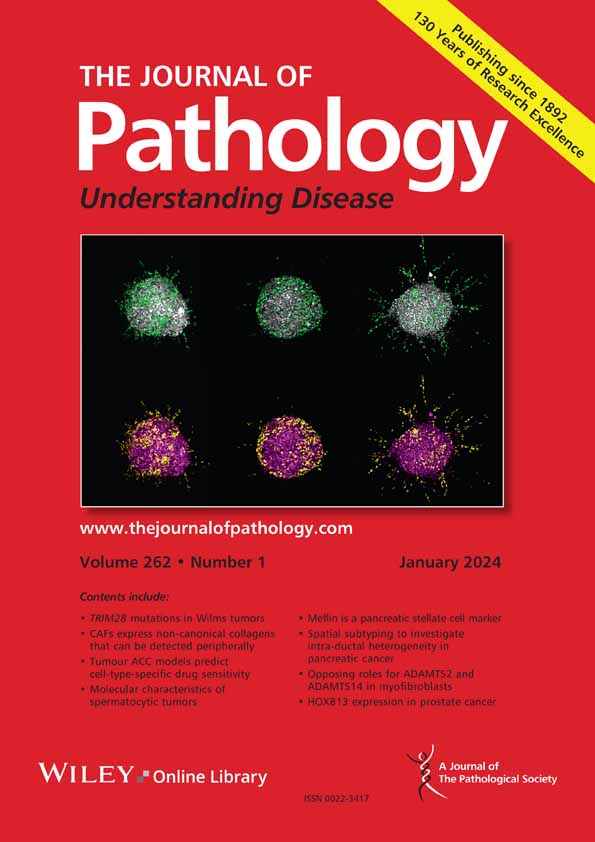求助PDF
{"title":"High-fat diets influence breast cancer progression by modulating CAF-immune cell interactions through PLAT signaling.","authors":"Weihan Li, Jiangshan He, Jingjing Li, Xingyu Xie, Peng Zhou","doi":"10.1002/path.6452","DOIUrl":null,"url":null,"abstract":"<p><p>Breast cancer progression is profoundly influenced by interactions within the tumor microenvironment, particularly between cancer-associated fibroblasts and immune cells. This study investigated how cancer-associated fibroblasts impact immune cells in the context of high-fat diets, focusing on key genes involved in these interactions. By analyzing breast cancer-related single-cell and bulk RNA sequencing data, we identified candidate genes in cancer-associated fibroblasts that influence immune cell behavior. Using the TCGA-BRCA dataset, we assessed the correlation between these genes and patient survival, as well as their role in immune cell infiltration and their association with clinical and immunological features. Our findings revealed significant cellular communication under high-fat diet conditions, with the cancer-associated fibroblast marker gene PLAT emerging as a key player linked to immune cell infiltration. Analysis of patient data from the GEO and TCGA-BRCA datasets revealed that in high-fat diet-induced breast cancer, patients exhibited reduced stromal scores, and stromal, immune, and ESTIMATE scores were significantly associated with clinical outcomes. In vivo murine experiments indicated that high-fat diets promoted tumor-associated macrophage infiltration while inhibiting CD4<sup>+</sup> T-cell activation. In vitro experiments confirmed that reduced PLAT expression facilitated M2 macrophage polarization and promoted cancer cell invasion and migration. Overall, our results highlight that high-fat diets can reshape the tumor microenvironment and accelerate breast cancer progression by modulating cancer-associated fibroblast-immune cell interactions, specifically via PLAT signaling. © 2025 The Pathological Society of Great Britain and Ireland.</p>","PeriodicalId":232,"journal":{"name":"The Journal of Pathology","volume":" ","pages":""},"PeriodicalIF":5.2000,"publicationDate":"2025-09-03","publicationTypes":"Journal Article","fieldsOfStudy":null,"isOpenAccess":false,"openAccessPdf":"","citationCount":"0","resultStr":null,"platform":"Semanticscholar","paperid":null,"PeriodicalName":"The Journal of Pathology","FirstCategoryId":"3","ListUrlMain":"https://doi.org/10.1002/path.6452","RegionNum":2,"RegionCategory":"医学","ArticlePicture":[],"TitleCN":null,"AbstractTextCN":null,"PMCID":null,"EPubDate":"","PubModel":"","JCR":"Q1","JCRName":"ONCOLOGY","Score":null,"Total":0}
引用次数: 0
引用
批量引用
Abstract
Breast cancer progression is profoundly influenced by interactions within the tumor microenvironment, particularly between cancer-associated fibroblasts and immune cells. This study investigated how cancer-associated fibroblasts impact immune cells in the context of high-fat diets, focusing on key genes involved in these interactions. By analyzing breast cancer-related single-cell and bulk RNA sequencing data, we identified candidate genes in cancer-associated fibroblasts that influence immune cell behavior. Using the TCGA-BRCA dataset, we assessed the correlation between these genes and patient survival, as well as their role in immune cell infiltration and their association with clinical and immunological features. Our findings revealed significant cellular communication under high-fat diet conditions, with the cancer-associated fibroblast marker gene PLAT emerging as a key player linked to immune cell infiltration. Analysis of patient data from the GEO and TCGA-BRCA datasets revealed that in high-fat diet-induced breast cancer, patients exhibited reduced stromal scores, and stromal, immune, and ESTIMATE scores were significantly associated with clinical outcomes. In vivo murine experiments indicated that high-fat diets promoted tumor-associated macrophage infiltration while inhibiting CD4+ T-cell activation. In vitro experiments confirmed that reduced PLAT expression facilitated M2 macrophage polarization and promoted cancer cell invasion and migration. Overall, our results highlight that high-fat diets can reshape the tumor microenvironment and accelerate breast cancer progression by modulating cancer-associated fibroblast-immune cell interactions, specifically via PLAT signaling. © 2025 The Pathological Society of Great Britain and Ireland.
高脂肪饮食通过PLAT信号调节caf -免疫细胞相互作用影响乳腺癌进展。
乳腺癌的进展受到肿瘤微环境内的相互作用的深刻影响,特别是癌症相关成纤维细胞和免疫细胞之间的相互作用。本研究调查了高脂肪饮食背景下癌症相关成纤维细胞如何影响免疫细胞,重点关注参与这些相互作用的关键基因。通过分析乳腺癌相关单细胞和大量RNA测序数据,我们确定了癌症相关成纤维细胞中影响免疫细胞行为的候选基因。利用TCGA-BRCA数据集,我们评估了这些基因与患者生存之间的相关性,以及它们在免疫细胞浸润中的作用,以及它们与临床和免疫学特征的关联。我们的研究结果揭示了高脂肪饮食条件下显著的细胞通讯,癌症相关成纤维细胞标记基因PLAT成为与免疫细胞浸润相关的关键参与者。GEO和TCGA-BRCA数据集的患者数据分析显示,在高脂肪饮食诱导的乳腺癌中,患者表现出基质评分降低,基质、免疫和ESTIMATE评分与临床结果显著相关。小鼠体内实验表明,高脂肪饮食促进肿瘤相关巨噬细胞浸润,同时抑制CD4+ t细胞活化。体外实验证实,PLAT表达降低可促进M2巨噬细胞极化,促进癌细胞的侵袭和迁移。总之,我们的研究结果强调,高脂肪饮食可以重塑肿瘤微环境,并通过调节癌症相关的成纤维细胞免疫细胞相互作用,特别是通过PLAT信号,加速乳腺癌的进展。©2025英国和爱尔兰病理学会。
本文章由计算机程序翻译,如有差异,请以英文原文为准。

 求助内容:
求助内容: 应助结果提醒方式:
应助结果提醒方式:


